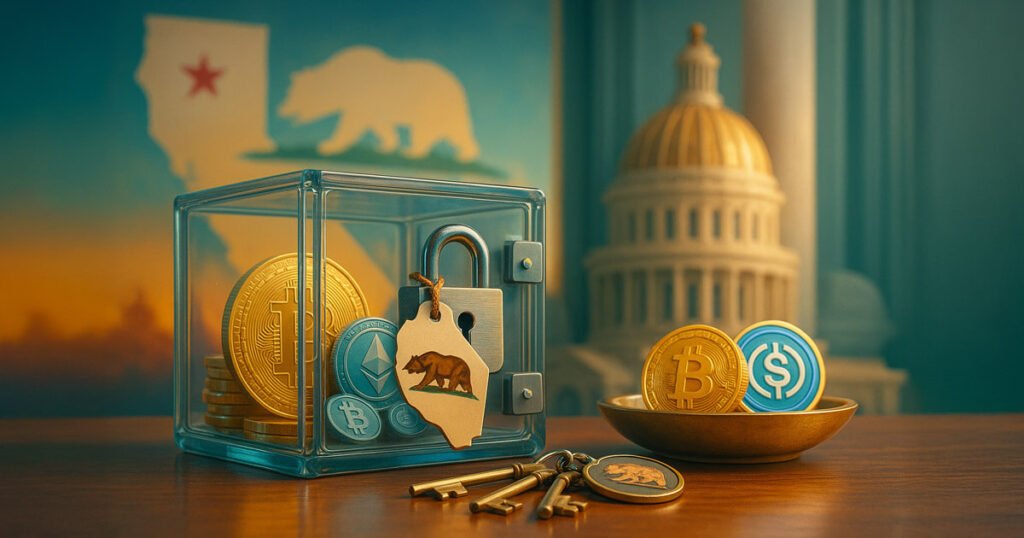California Takes the Lead in Cryptocurrency Law with SB 822
On October 11, California Governor Gavin Newsom signed SB 822, a groundbreaking law that positions California as the first state in the United States to protect unclaimed cryptocurrency from forced liquidation. This new statute amends the state’s Unclaimed Property Law, mandating that dormant cryptocurrencies be preserved in their original form rather than being immediately converted to cash. This innovative approach addresses a common friction point in digital asset escheatment—when exchanges or custodians hand over inactive accounts under existing unclaimed property laws, often liquidating the cryptocurrency into fiat currency. With this new legislation, California aims to redefine how unclaimed digital assets are treated, ensuring that original coins are returned to their rightful owners when claimed.
Recognizing the Challenges in Crypto Escheatment
Prior to SB 822, many states automatically liquidated cryptocurrency assets when they were deemed dormant, converting them into cash. This practice posed various challenges for asset owners, as they would often receive the fiat currency at a value determined by the state’s sale price and timing, which may not reflect the true market value of the asset. The new law changes this paradigm, allowing the state to hold unclaimed cryptocurrency assets as is—in kind. This shift is significant, especially for owners who may later reclaim these assets, enabling them to receive what they initially owned rather than simply cash equivalent. By aligning the treatment of cryptocurrency with that of traditional financial assets like securities and bank accounts, California is setting a precedent that may influence how other states handle digital financial assets.
Mitigating Tax Implications for Owners
One of the notable benefits of SB 822 is its ability to mitigate tax implications for cryptocurrency owners. When a state liquidates a crypto asset and returns the resulting fiat currency to the original owner, capital gains taxes can become an issue, based on the sale price and timing of the state’s liquidation. By holding assets in kind until claimed, California’s policy allows asset owners to avoid unexpected tax liabilities, making the process more favorable for individuals. Additionally, this in-kind requirement is seen as a harm reduction measure, ensuring that if assets do escheat, owners can recover the original cryptocurrency rather than facing potential losses associated with forced liquidation.
Protecting Digital Financial Assets
The law specifically applies to "digital financial assets" as outlined in California Financial Code §3102(g), covering both cryptocurrencies and stablecoins held by third-party custodians on behalf of California residents. This way, exchanges, hosted wallet providers, and any financial organizations serving as custodians must directly transfer the assets to the State Controller instead of liquidating them. Under SB 822, custodians are accountable for notifying clients of inactivity, sending pre-escheat notices six to twelve months before reporting inactivity, and maintaining communication to potentially restart the dormancy clock. This structured approach is aimed at protecting asset owners who may have temporarily forgotten or lost access to their accounts.
Managing and Custodying Dormant Assets
When digital financial assets escheat to the state, California’s State Controller will place them with custodians licensed by the Department of Financial Protection and Innovation. Importantly, the law acknowledges the complexities of crypto custody, addressing multi-signature requirements and the differentiation between self-custody and third-party custodianship. While self-custody wallets are excluded from this legal framework, this targeted approach reflects California’s recognition of the unique nature of cryptocurrencies and digital assets. Furthermore, the law sets a defined timeline for conversion, treating owners’ rights with respect and care, with the ability to recover original assets for at least 18 months after escheatment.
Implications for Other States
California’s SB 822 not only reshapes the landscape for cryptocurrency holders within its borders but could also reverberate across the nation. Other states may take notice of California’s prioritization of the recovery of original digital assets over administrative convenience, potentially leading to similar regulations elsewhere. The law’s innovative focus on in-kind holding as the default for unclaimed digital assets marks a significant step forward in the legal recognition of cryptocurrency, further bridging the gap between traditional finance and the evolving digital asset landscape. As the trend towards cryptocurrency adoption accelerates, similar legislative measures may not be far behind in other jurisdictions keen to stay relevant in the fast-paced digital economy.
In conclusion, California’s SB 822 introduces a new layer of protection for cryptocurrency holders, addressing potential tax implications and ensuring that rightful owners can reclaim their digital assets without undue burdens. This pioneering legislation stands to influence not just local governance, but the broader framework surrounding cryptocurrency regulation in the United States, allowing California to lead the way in fostering an ecosystem that better accommodates digital financial assets. By creating a more favorable environment for cryptocurrency owners, California has set an important precedent that could transform how unclaimed digital assets are treated across the nation.

















